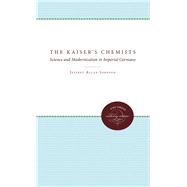The Kaiser's Chemists
, by Johnson, Jeffrey Allan- ISBN: 9780807865491 | 0807865494
- Cover: Paperback
- Copyright: 9/1/2010
In the early twentieth century, an elite group of modern-minded scientists in Germany, led by the eminent organic chemist Emil Fischer, set out to create new centers and open new sources of funding for chemical research. Their efforts led to the establishment in 1911 of the chemical institues of the Kaiser Wilhelm Society for the Advancement of the Sciences, whose original staff included several future Nobel laureates. Although these institutes were designed to promote "free research" that would uphold German Leadership in international science, they also came to promote the integration of science in the German war effort after 1914. According to Jeffrey Johnson, the development of the Kaiser Wilhelm Institutes exemplifies the origins and dilemmas of one of the most significant innovations in modern science: the creation of institutions for basic research, both theoretical and practical. The Kaiser Wilhelm Society was a quasi-official institution under the "protection" of Kaiser Wilhelm II, but it received most of its funding from German industry rather than the Imperial Treasury. After 1914, however, the Kaiser's chemists and their institutes provided key support to the German war effort. Within a few months of the outbreak of World War I, the institutes had been integrated into war mobilization activities. They conducted research both in weapons, such as poison gas, and in strategic resources, especially synthetics to replace naturally produced goods cut off by Britain's blockade of German ports. By examining the Kaiser Wilhelm Society in the framework of both scientific and social change, Johnson is able to answer questions that seem puzzling if not viewed from this dual perspective, such as why German chemists pushed for institutional change at this particular time. Johnson argues that the new institutes arose from a characteristically modern tension between internationally set scientific goals and the competing national priorities of a country headed for war. Johnson's sources include the papers of Emil Fischer; the archives of several major German corporations, including Bayer, Hoechst, and Krupp; government records; and the archives of the Max Planck Society, which grew out of the Kaiser Wilhelm Society after World War II. A UNC Press Enduring Edition -- UNC Press Enduring Editions use the latest in digital technology to make available again books from our distinguished backlist that were previously out of print. These editions are published unaltered from the original, and are presented in affordable paperback formats, bringing readers both historical and cultural value.






